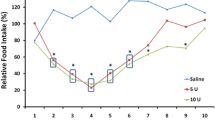Abstract
Botulinum toxin prevents acetylcholine release at motor nerve terminals. Group B vitamins (B-vit) are essential for proper nerve function. The present study addresses the question of whether B-vit accelerate recovery in rat skeletal muscle after botulinum toxin A (Btx-A) injection. Forty-four adult male Wistar albino rats were used in this experimental study. Rats were divided into three groups: group 1 rats were given Btx-A injection only, group 2 rats were given B-vit supplementation before Btx-A injection, and group 3 rats were given Btx-A and B-vit injections together. During the experiment, compound muscle action potential (CMAP) of the gastrocnemius muscle was recorded before Btx-A injection and sequentially ten times after toxin injection. The statistical significance of the CMAP amplitude change among the groups was analyzed. All groups showed similar amplitude change between consecutive measurement points. In conclusion, combining Btx-A injection with B-vit supplement does not decrease the efficacy of the toxin.




Similar content being viewed by others
Abbreviations
- Btx-A:
-
Botulinum toxin A
- B-vit:
-
B vitamins
- CMAP:
-
Compound muscle action potential
- EMG:
-
Electromyography
References
Aoki KR (2001) Pharmacology and immunology of botulinum toxin serotypes. J Neurol 248(Suppl 1):3–10
Aoki KR (2005) Pharmacology and immunology of botulinum neurotoxins. Int Ophthalmol Clin 45:25–37
Becker KW, Kienecker EW, Dick P (1990) A contribution to the scientific assessment of degenerative and regenerative processes of peripheral nerve fibers following axonotmesis under the systemic administration of vitamins B1, B6 and B12—light and electron microscopy findings of the saphenous nerve in the rabbit. Neurochirurgia (Stuttg) 33(4):113–121
Cherington M (1998) Clinical spectrum of botulism. Muscle Nerve 21:701–710
Jolivalt CG, Mizisin LM, Nelson A, Cunha JM, Ramos KM, Bonke D, Calcutt NA (2009) B vitamins alleviate indices of neuropathic pain in diabetic rats. Eur J Pharmacol 612(1–3):41–47
Klein AW (2004) Contraindications and complications with the use of botulinum toxin. Clin Dermatol 22:66–75
Kuwabara S, Nakazawa R, Azuma N, Suzuki M, Miyajima K, Fukutake T, Hattori T (1999) Intravenous methylcobalamin treatment for uremic and diabetic neuropathy in chronic hemodialysis patients. Intern Med 38:472–475
Maselli RA, Bakshi N (2000) AAEM case report 16. Botulism. American Association of Electrodiagnostic Medicine. Muscle Nerve 23:1137–1144
Oh SJ (1993) General concepts of electrodiagnostic studies in neuromuscular disease. In: Retford DC (ed) Clinical electromyography nerve conduction studies, 2nd edn. Baltimore, Williams Wilkins, pp 15–26
Suarez AG (2006) Peripheral neuropathy associated with alcoholism, malnutrition and vitamin deficiencies. In: Noseworthy JH (ed) Neurological therapeutics principles and practice, 2nd edn. Informa Healthcare, London, pp 2294–2307
Talaei A, Siavash M, Majidi H, Chehrei A (2009) Vitamin B12 may be more effective than nortriptyline in improving painful diabetic neuropathy. Int J Food Sci Nutr 60(Suppl 5):71–76
Wang ZB, Gan Q, Rupert RL, Zeng YM, Song XJ (2005) Thiamine, pyridoxine, cyanocobalamin and their combination inhibit thermal, but not mechanical hyperalgesia in rats with primary sensory neuron injury. Pain 114:266–277
Zochodne DW (2000) The microenvironment of injured and regenerating peripheral nerves. Muscle Nerve Suppl 9:S33–S38
Conflicts of interest
The authors have no conflicts of interest to disclose.
Author information
Authors and Affiliations
Corresponding author
Rights and permissions
About this article
Cite this article
Tatlidede, S., Baslo, M.B., Özkaya, Ö. et al. Does Vitamin B Alter the Efficacy of Botulinum Toxin?. Aesth Plast Surg 36, 692–697 (2012). https://doi.org/10.1007/s00266-012-9873-6
Received:
Accepted:
Published:
Issue Date:
DOI: https://doi.org/10.1007/s00266-012-9873-6




